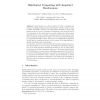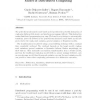148 search results - page 21 / 30 » Self-stabilization of Byzantine Protocols |
SRDS
2007
IEEE
14 years 4 months ago
2007
IEEE
Fault tolerant distributed protocols typically utilize a homogeneous fault model, either fail-crash or fail-Byzantine, where all processors are assumed to fail in the same manner....
WDAG
2005
Springer
14 years 3 months ago
2005
Springer
Randomness is a critical resource in many computational scenarios, enabling solutions where deterministic ones are elusive or even provably impossible. However, the randomized solu...
DSN
2002
IEEE
14 years 2 months ago
2002
IEEE
This paper describes a Secure INtrusion-Tolerant Replication Architecture1 (SINTRA) for coordination in asynchronous networks subject to Byzantine faults. SINTRA supplies a number...
PODC
1999
ACM
14 years 2 months ago
1999
ACM
ÐIn this paper, we investigate the k-set consensus problem in asynchronous distributed systems. In this problem, each participating process begins the protocol with an input value...
IANDC
2007
13 years 9 months ago
2007
ectly-synchronized round-based model provides the powerful abstraction of op failures with atomic and synchronous message delivery. This abstraction makes distributed programming ...


